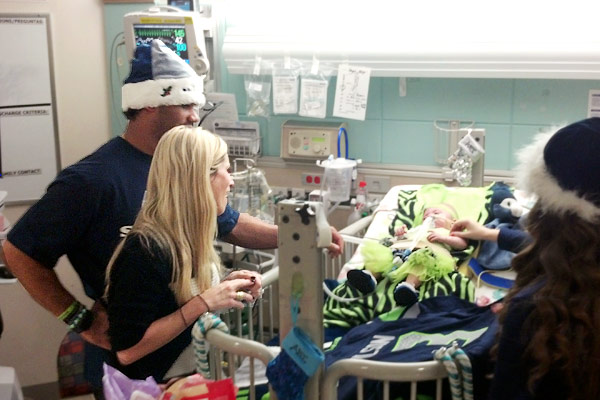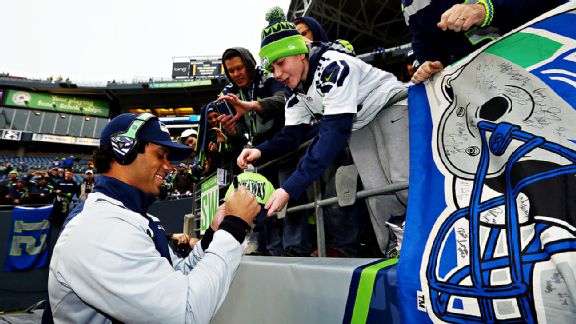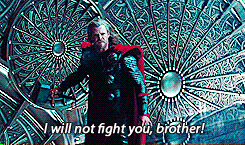Tuesday, February 10, 2015
Wednesday, February 4, 2015
Don't Quit
I know I posted about Russell Wilson yesterday, but I am impressed by his response to the criticism he has received after the Super Bowl and by the character he continues to exhibit. Teens, if you're looking for a role model in a professional athlete, he is a great one to emulate. Here is a recent Facebook post from Mr. Wilson.
Thank you to a good friend for passing this inspirational message along. 12's, share this with your friends and loved ones if you are already focusing on next season.#DontQuit
When things go wrong, as they sometimes will,
When the road you're trudging seems all uphill,
When the funds are low and the debts are high,
And you want to smile, but you have to sigh,
When care is pressing you down a bit-
Rest if you must, but don't you quit.
Life is queer with its twists and turns,
As every one of us sometimes learns,
And many a fellow turns about
When he might have won had he stuck it out.
Don't give up though the pace seems slow -
You may succeed with another blow.
Often the goal is nearer than
It seems to a faint and faltering man;
Often the struggler has given up
When he might have captured the victor's cup;
And he learned too late when the night came down,
How close he was to the golden crown.
Success is failure turned inside out -
The silver tint in the clouds of doubt,
And you never can tell how close you are,
It might be near when it seems afar;
So stick to the fight when you're hardest hit -
It's when things seem worst that you must not quit.
Thank you to a good friend for passing this inspirational message along. 12's, share this with your friends and loved ones if you are already focusing on next season.#DontQuit
When things go wrong, as they sometimes will,
When the road you're trudging seems all uphill,
When the funds are low and the debts are high,
And you want to smile, but you have to sigh,
When care is pressing you down a bit-
Rest if you must, but don't you quit.
Life is queer with its twists and turns,
As every one of us sometimes learns,
And many a fellow turns about
When he might have won had he stuck it out.
Don't give up though the pace seems slow -
You may succeed with another blow.
Often the goal is nearer than
It seems to a faint and faltering man;
Often the struggler has given up
When he might have captured the victor's cup;
And he learned too late when the night came down,
How close he was to the golden crown.
Success is failure turned inside out -
The silver tint in the clouds of doubt,
And you never can tell how close you are,
It might be near when it seems afar;
So stick to the fight when you're hardest hit -
It's when things seem worst that you must not quit.
Tuesday, February 3, 2015
Russell Wilson, Faith, and the Corporal Works of Mercy
As we explore the Corporal Works of Mercy with our middle schoolers, I thought it was appropriate to see how one person is visiting the sick and imprisoned at Children's Hospital in Seattle. That one person happens to be Russell Wilson, who you may know from quarterbacking the Seattle Seahawks to two straight Super Bowls and throwing a history-altering interception at the goal line on Sunday, but he proves with his faith and choices off the field that life is much bigger than football.
This article comes from ESPN.com and is authored by Kevin Van Valkenburg.
SEATTLE -- If you want to understand why Russell Wilson might go down as the most important player in the history of the Seattle Seahawks, maybe even the most important athlete to ever ply his trade in the Pacific Northwest, you can't begin with football.
It's better to start with a story of a beautiful five-pound boy, and his imperfect, broken heart.
In the months leading up to the birth of his twin sons, Seattle salesman Dave Quick daydreamed about sports the way so many young, first-time fathers do. When he closed his eyes, he could see the three of them, years from now, laughing and roughhousing in the yard. He imagined teaching the boys how to catch footballs, how to turn double plays, how to shrug it off when you skinned your knee. His parental anxieties were overwhelmed by the dual joys of anticipation and excitement.
Reality, however, is almost always more complicated than daydreams. In a series of sonograms late in his wife Kristina's pregnancy, doctors spotted a few abnormalities they said "concerned them." One of the boys -- the Quicks would name them Harrison and Franklin -- had a heart that wasn't developing properly. Sonograms, they warned the Quicks, can be part science, part guesswork, so it was difficult to say what it might mean when they were born. Doctors urged Dave and Kristina to focus on the positive, not the unknown.
But when the boys were born at Evergreen Hospital in the early morning hours of Oct. 30, the truth was obvious: Harrison was healthy, but Franklin needed to be moved, right away, to the ICU of Seattle Children's Hospital. His condition was worse than doctors initially feared. In addition to problems with his heart, his intestines hadn't properly developed. There was a chance the condition could be fatal.
The next week unfolded for the Quicks as a stress-induced, semi-sleepless blur. Surgeons went to work fixing Franklin's intestines, and sketched out a plan for how to fix his heart. Dave Quick learned to sleep, rarely for more than 10 minutes at a time, sitting in a chair next to Franklin's bed. Nurses would shuffle in and out of the room at all hours, and soon Quick lost track of where days began and nights ended. At one point, one of the nurses noticed Franklin wasn't breathing, and an army of medical personnel swarmed into the room to snake a tube down his tiny throat and bring him back to life. "I basically lost my mind," Quick says. "I went into the hallway and I more or less crumbled."
Franklin survived, and he survived a 10-hour open-heart surgery several days later, but he wasn't out of danger. The weeks and months to come would be critical. A few days later, Quick was half asleep next to his son when a stranger walked into the room. For a moment, Quick wasn't sure if he was dreaming or imagining things. But then the stranger, Seahawks quarterback Russell Wilson, did something the Quicks will never forget.
He hugged them.
He told the Quicks he and his wife, Ashton, had heard about Franklin, and they'd been thinking about him a lot. They'd been praying for him every day. They just wanted to stop by and let the Quicks know they were pulling for Franklin.
"I think I probably experienced about 10 different emotions," Quick says. "Shock, disbelief, but most of all, pure genuine joy. For someone of his stature to do that is just amazing. For 20 minutes, he enabled us to not think about everything we were going through. He greeted us like we were family. I'd heard about these visits, that it was something he liked to do, but you see him walk through that door and you know he's the real deal. He is truth."
----------------------------
What does a star athlete really mean to the city where he plays?
It's a complicated question, and the truth is, the answer varies depending on the market and the athlete. In certain cities -- perhaps even in a majority of cities -- it means little. There is no larger bond formed with fans, no deeper resonance. And there's nothing wrong with viewing it as a business relationship, to be frank. It's just sports, after all. Some athletes you simply cheer for on Sundays, and don't think about much beyond the white lines.
But as the Seahawks prepare to play in the Super Bowl for the second time in team history this Sunday, as the franchise tries to capture the city's first major sports title since 1979, much of Seattle would like you to understand the feelings people have for their 25-year-old quarterback, Russell Carrington Wilson, are a little different.
It goes beyond his escapability, his humility or his accuracy with a football. It's what he's done with his time in just two short years, and what he represents.
"I think we've all fallen in love with the guy," says James Paxton, a Seahawks fan who dyed his goatee bright green and his mustache dark blue for the team's playoff run. "He gave us hope back."
Click here to continue reading.
This article comes from ESPN.com and is authored by Kevin Van Valkenburg.
SEATTLE -- If you want to understand why Russell Wilson might go down as the most important player in the history of the Seattle Seahawks, maybe even the most important athlete to ever ply his trade in the Pacific Northwest, you can't begin with football.
It's better to start with a story of a beautiful five-pound boy, and his imperfect, broken heart.
In the months leading up to the birth of his twin sons, Seattle salesman Dave Quick daydreamed about sports the way so many young, first-time fathers do. When he closed his eyes, he could see the three of them, years from now, laughing and roughhousing in the yard. He imagined teaching the boys how to catch footballs, how to turn double plays, how to shrug it off when you skinned your knee. His parental anxieties were overwhelmed by the dual joys of anticipation and excitement.
Reality, however, is almost always more complicated than daydreams. In a series of sonograms late in his wife Kristina's pregnancy, doctors spotted a few abnormalities they said "concerned them." One of the boys -- the Quicks would name them Harrison and Franklin -- had a heart that wasn't developing properly. Sonograms, they warned the Quicks, can be part science, part guesswork, so it was difficult to say what it might mean when they were born. Doctors urged Dave and Kristina to focus on the positive, not the unknown.
But when the boys were born at Evergreen Hospital in the early morning hours of Oct. 30, the truth was obvious: Harrison was healthy, but Franklin needed to be moved, right away, to the ICU of Seattle Children's Hospital. His condition was worse than doctors initially feared. In addition to problems with his heart, his intestines hadn't properly developed. There was a chance the condition could be fatal.
The next week unfolded for the Quicks as a stress-induced, semi-sleepless blur. Surgeons went to work fixing Franklin's intestines, and sketched out a plan for how to fix his heart. Dave Quick learned to sleep, rarely for more than 10 minutes at a time, sitting in a chair next to Franklin's bed. Nurses would shuffle in and out of the room at all hours, and soon Quick lost track of where days began and nights ended. At one point, one of the nurses noticed Franklin wasn't breathing, and an army of medical personnel swarmed into the room to snake a tube down his tiny throat and bring him back to life. "I basically lost my mind," Quick says. "I went into the hallway and I more or less crumbled."
Franklin survived, and he survived a 10-hour open-heart surgery several days later, but he wasn't out of danger. The weeks and months to come would be critical. A few days later, Quick was half asleep next to his son when a stranger walked into the room. For a moment, Quick wasn't sure if he was dreaming or imagining things. But then the stranger, Seahawks quarterback Russell Wilson, did something the Quicks will never forget.
He hugged them.
He told the Quicks he and his wife, Ashton, had heard about Franklin, and they'd been thinking about him a lot. They'd been praying for him every day. They just wanted to stop by and let the Quicks know they were pulling for Franklin.
"I think I probably experienced about 10 different emotions," Quick says. "Shock, disbelief, but most of all, pure genuine joy. For someone of his stature to do that is just amazing. For 20 minutes, he enabled us to not think about everything we were going through. He greeted us like we were family. I'd heard about these visits, that it was something he liked to do, but you see him walk through that door and you know he's the real deal. He is truth."
----------------------------
What does a star athlete really mean to the city where he plays?
It's a complicated question, and the truth is, the answer varies depending on the market and the athlete. In certain cities -- perhaps even in a majority of cities -- it means little. There is no larger bond formed with fans, no deeper resonance. And there's nothing wrong with viewing it as a business relationship, to be frank. It's just sports, after all. Some athletes you simply cheer for on Sundays, and don't think about much beyond the white lines.
But as the Seahawks prepare to play in the Super Bowl for the second time in team history this Sunday, as the franchise tries to capture the city's first major sports title since 1979, much of Seattle would like you to understand the feelings people have for their 25-year-old quarterback, Russell Carrington Wilson, are a little different.
It goes beyond his escapability, his humility or his accuracy with a football. It's what he's done with his time in just two short years, and what he represents.
"I think we've all fallen in love with the guy," says James Paxton, a Seahawks fan who dyed his goatee bright green and his mustache dark blue for the team's playoff run. "He gave us hope back."
Click here to continue reading.
Friday, January 30, 2015
January/February Parent Newsletter
Get the scoop on what's happening with our teens at OLV by reading our January/February Parent Newsletter.
Click here to read.
Click here to read.
Monday, January 26, 2015
Being Pro-Life as Told by the Avengers
“We ARE the Pro-Life Generation!”
That is the battle cry of this generation’s army of pro-life awesomeness.
This generation is battling for the dignity of life in a culture of death.
There is an assembled group of people who knows what it takes to battle an army: The Avengers.
Believe it or not, The Avengers know what it means to be pro-life.
Don’t believe me?
I’ll let The Avengers tell you how it feels being pro-life.
1. When you tell someone you’re pro-life:
#sorrynotsorry
2. How you feel when you rationally talk to someone about their views on pro-life issues, but they’re having none of it.
Don’t want to hear scientific facts?… Well okay then!
3. When friends who aren’t pro-life want to fight about it. EVERY. TIME. THEY. SEE. YOU.
Please, tell me again how I need to “get with the times.”
To continue reading, click here.
That is the battle cry of this generation’s army of pro-life awesomeness.
This generation is battling for the dignity of life in a culture of death.
There is an assembled group of people who knows what it takes to battle an army: The Avengers.
Believe it or not, The Avengers know what it means to be pro-life.
Don’t believe me?
I’ll let The Avengers tell you how it feels being pro-life.
1. When you tell someone you’re pro-life:
#sorrynotsorry
2. How you feel when you rationally talk to someone about their views on pro-life issues, but they’re having none of it.
Don’t want to hear scientific facts?… Well okay then!
3. When friends who aren’t pro-life want to fight about it. EVERY. TIME. THEY. SEE. YOU.
Please, tell me again how I need to “get with the times.”
To continue reading, click here.
Wednesday, January 21, 2015
You're a Great Man: 29 Catholic Girls Explain Why
Sometimes I hear girls complain about the fact that they can’t find any good guys.
I don’t know what they’re talking about.
They are everywhere and I am blessed to have the privilege to know so many of them. I see great men in my grandfathers, my father, brothers, uncles, cousins, friends, co-workers, boyfriends, and neighbors.
These men inspire me to be a better woman. So thank you. Thank you for being a great man when you hold your temper… when you tell me I’m beautiful… when you’re okay with not being the center of my universe because you know Jesus deserves and holds that place… when you’re not afraid to call me out, to let me know the areas I need to grow in no matter how awkward it may be. You’re a great man when you refuse to let me be stubborn about my independence when it’s obvious I need a more skilled, helping hand.
If any man were to question whether or not his life has meaning, whether he has “made it” as a man, I’m here to tell you that I asked your sisters in Christ to affirm the great men that they know and I got over 6 pages of responses. We see your efforts. And we appreciate you. Keep striving to be the best version of yourself; and if you’re ever unsure if it makes a difference… read this again.
YOU’RE A GREAT MAN WHEN…
“You’re a great man when you make bold sacrifices.” – Leah M.
“You’re a great man when you remember to greet my friends and family members when we’re out together. That simple hello says a lot about your character!” – Erin H.
“You’re a great man when you inspire me to be a better person by the way you live each day. When you work out not for vanity’s sake, but so you can be the strength I lean on. And after all, what’s the point of triceps if you’re not using them to lift the old woman’s suitcase into the overhead compartment on the airplane? I want you to know that more than any compliments or courtesy’s you show to me, I watch the way you treat the cashier, the waitress, your little sister. The little moments of you being an authentic man of God in the small everyday ways, those are the ones that count.” – Maureen M.
“You are a great man when you show love for the Blessed Mother.” – Casey O.
Click here to continue reading.
Wednesday, January 14, 2015
My Marriage Wasn't Meant to Be
This is an excerpt from a blog by Matt Walsh on TheBlaze.com. It's not meant to endorse any political views from the site.
"I didn’t marry my wife because she’s *The One*, she’s The One because I married her. Until we were married, she was one, I was one, and we were both one of many. I didn’t marry The One, I married this one, and the two of us became one. I didn’t marry her because I was “meant to be with her,” I married her because that was my choice, and it was her choice, and the Sacrament of marriage is that choice. I married her because I love her — I chose to love her — and I chose to live the rest of my life in service to her. We were not following a script, we chose to write our own, and it’s a story that contains more love and happiness than any romantic fable ever conjured up by Hollywood."
Click here to continue reading.
"I didn’t marry my wife because she’s *The One*, she’s The One because I married her. Until we were married, she was one, I was one, and we were both one of many. I didn’t marry The One, I married this one, and the two of us became one. I didn’t marry her because I was “meant to be with her,” I married her because that was my choice, and it was her choice, and the Sacrament of marriage is that choice. I married her because I love her — I chose to love her — and I chose to live the rest of my life in service to her. We were not following a script, we chose to write our own, and it’s a story that contains more love and happiness than any romantic fable ever conjured up by Hollywood."
Click here to continue reading.
Monday, January 12, 2015
Wednesday, January 7, 2015
First Communion and Confirmation Worksheets Posted
Have you missed a couple of OLV Teen Nights? Do you need to make up for your absences? There are now worksheets available on this blog for teens preparing to receive the Sacraments of First Communion and Confirmation. Look at the right column for the links, print the worksheet, complete it with the help of your book, and return it at the registration table during the next OLV Teen Night. Questions? Contact Daniel at dmiller at olvcaldwell.org or 208-459-3653, ext. 3009.
Tuesday, January 6, 2015
How Great We Aren't: The Catholic Church in America Today
Those who follow baseball know that the past decade has seen what is called the “Moneyball” revolution in how players are evaluated. In the past, players were gauged using popular, preconceived narratives: Who knocks in the most runs? Who gets the most hits? However, it has been shown in recent years that these questions are not actually predictive of which players truly help their teams win games. For years the experts were analyzing the situation with a preconceived narrative in place, and were therefore prone to ignore the data that didn’t jibe with that narrative. Now, however, new advanced statistical tools have been deployed to discover exactly how much each player contributes to team wins. Moneyball advocates stress that the correct data, looked at dispassionately, is the best way to analyze a situation and come to accurate conclusions.
Nowhere is a preconceived narrative more entrenched than in the Catholic Church in America today. Imagine your own Catholic parish. Can you think of any time that the pastor got up and said, “Listen, things are not good – the school is failing to educate kids in the Faith, people are leaving in droves, and no one believes Catholic doctrine anymore”? Of course not; usually we are told how great the school is, how great the parish is and that we are great, great, great – surely one day we will reword the classic hymn to “How Great We Art”. The message is that we should just keep doing everything as we have done it for the past generation: catechesis, marriage preparation, liturgy, and so on.
But will an objective look at the numbers show that everything is in fact fine? In recent years several studies have been conducted that give an in-depth look at the practices (and non-practices) of Catholics in America.
A major study done by Pew Research in 2009 found that over 30% of Americans who were raised Catholic no longer consider themselves Catholic. This is a well-known figure, but what about those who do still self-identify as Catholic? These are the people who still have some attachment to the Church, at least enough to call themselves “Catholic.” According to one study, less than 30% of them attend Mass once a week, and according to another study, only 25% go to Confession at least once a year. Furthermore, only 62% of those who attend Mass weekly also go to Confession at least once a year.
Putting all these numbers together, we find that less than 10% of baptized Catholics in this country both attend Mass on Sundays and go to Confession at least once a year. In other words, less than 1 in 10 baptized Catholics actually follow the two most measurable precepts of the Church, which all Catholics are obliged to follow.
Click here to continue reading.
Subscribe to:
Posts (Atom)












